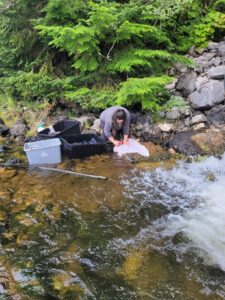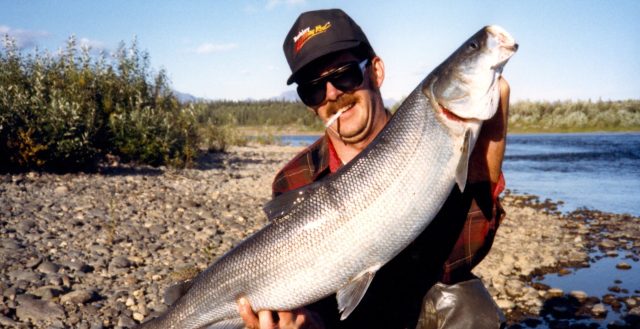“We’re free to be poor.” International Game Fish Association/Getty Images

Who in their right mind would choose to live without a washing machine? To most of us, life without this miraculous modern contraption is a sign of abject poverty and domestic tyranny. A woman who is forced to wash her family’s clothing in a river is deserving of our deepest pity, her husband of our disdain.
This was not the view of “Guy Alaska”, who earlier this month posted a photo on Twitter of his wife doing just this. “She has been doing our laundry like this for TWO YEARS,” he wrote. “She can’t even feel her feet and she’s shivering in front of the woodstove. A true heroine. Comment ‘❤️’ to show your appreciation for this monument of a woman.”
Quite unsurprisingly, Guy’s post provoked a backlash. Why had his family chosen the harsh pioneer path — living off-grid and without running water — happily and intentionally. What could possibly make this couple choose to live, to put it bluntly, like poor people? The answer, as I found out, is both straightforward and illuminating.
Guy Alaska is originally from Michigan, but his wife, Shay, is an Alaska Native. With several young children, they were living on an acreage in Michigan when their house burned down two years ago. The insurance money didn’t cover a rebuild, so they decided to start afresh in Shay’s homeland, something they had long been dreaming of.

Guy tells me that, for them, Alaska represented “one of the last free places” in America. “There’s still plenty of places in Alaska where you can buy land,” he says. “You own it — you don’t have to pay anybody so-called ‘property taxes’, which means you’re free to not have to earn money, which means you’re free to not participate in a system that you don’t want to participate in.” For him and Shay, the goal was to opt out of what sociologist Michael Bell calls “the treadmill of consumption”, which describes the way in which people in highly developed countries try to “keep up with the Joneses” through more and more material consumption, without any real gains in overall happiness or satisfaction.
After their house in Michigan burned down, the Alaskas started out by camping in a Mongolian yurt in different locations in her home village, but soon grew tired of getting evicted and decided to broaden their search. They soon found the perfect spot: three acres on an island that cost just under the $30,000 they had in savings. The couple bought the land sight unseen and set off. “We just showed up here with all that stuff, and basically blazed a trail into the woods with a pair of loppers until we found a spot that we could build on,” Guy says.
In the past two years, Guy has built a 75-square-metre cabin and a woodworking shop that doubles as a barn. He has also cleared a half-acre of forest for hay, installed paddock fencing around a quarter acre and a small solar panel system for electricity, as well as building a two-hole outhouse and a smoker for smoking fish and game. All the while, the Alaska family has subsisted off the land: on one occasion, Guy hunted down a bear which Shay then prepared by hand with her youngest in a baby carrier on her back.
While the family has accomplished a lot, they don’t yet have a rainwater harvesting system to collect enough water for indoor plumbing. This means they have to haul water to use in their home, which makes washing in the river an attractive option. Guy takes odd jobs in carpentry and milling to pay for things the family can’t produce themselves, and he is saving up to eventually buy a washing machine. (Even hardcore off-gridders see a benefit in that.)
The Alaskas aren’t the first American family to vanish into the wilderness. The early pioneer stage of the United States is central to its ethos and self-image. Americans think of themselves as valuing self-reliance, and central to that belief is having the courage to resist the push of conformity. Ralph Waldo Emerson’s key text on the topic implores: “Trust thyself: every heart vibrates to that iron string.” But with industrialisation, mass wealth and the expansion of the welfare state, there has been an upending of this value in lieu of a new worship of consumerism, ever-increasing material standards of living, and vague notions of “progress”.
Even as writers such as Steven Pinker insist that this ever-increasing mass affluence is always a net good, we are reaching material, environmental and even spiritual limits that are causing breaks in the normal functioning of society. The way they see it, the Alaska family isn’t recreating the pioneer lifestyle for merely philosophical or spiritual reasons. First and foremost, they see their path as logical: “You have these huge systems that everybody’s really relying on, and to be free for us out here, we can’t rely on those systems.”
For Guy and Shay, the path of freedom necessarily aligns with a rational desire to be both self-reliant and prepared for the potential breaks in those systems. They are not alone in their thinking. Before the Covid pandemic, about 10 million people in the United States would fit the definition of a “prepper” or “resilient citizen”, with the ability and resources to survive any kind of disaster for at least one month. Following Covid, that number has jumped to about about 20 million. There is an increasing sense of unease at the prospect of a world of escalating disasters — chlorine gas spills, zoonotic diseases, typhoons, solar flares, civil unrest, terrorism, and full-scale war — but also a loss of faith in the state’s ability to help its citizens in times of emergency.
The recent wildfires in Hawaii are a clear example. Citizen accounts assert that people were waiting over a week for any help from the government, after a catastrophic failure of state warning systems: the only assistance came from fellow citizens sharing resources and generator power. While officials report only 114 confirmed deaths, journalists attempting to cover the story suggest the death toll could be far greater. The lack of reliable reporting on disasters such as this further undermines people’s trust in institutions, strengthening their desire to pursue resilience on a household or community level.
But fear is not the only motive behind self-reliance. Though Guy and Shay want to be prepared for a potential disaster, they are also interested in connecting with a deep cultural lineage. “We kind of settled on staying in southeast Alaska, just because Shay’s heritage is here. Her people have been here for 4,000 years, and that’s our children’s heritage too. They have rights to hunt marine mammals like seals and sea otters, and we wanted to be close to their culture, so they can stay involved with it. As far as our philosophy goes, we’re interested in authenticity.”
To that end, the Alaska family has an ongoing fundraising campaign to buy their family a yak for use on their homestead. They’d like to move away from reliance on cars to something more sustainable, and plan to use the yak to get them to town, to move fish and game, and to log their land. Functionally, a yak can do most of what a tractor can do, but, as Guy says, “the only difference is you can’t go quite as fast”. In many ways, despite being rural conservatives, the Alaska family is living a progressive “degrowth” lifestyle, with lower consumption, low energy use, and sustainable livelihoods.
But the online backlash to their lifestyle suggests a growing bifurcation between those Americans who want to exercise individual liberty and those who are shackled by the ideology of mass affluence or the drive for status. Not that it bothers Guy and Shay to be called “really poor”. They think they’re the lucky ones. As Guy says, “We’re free to be poor.”










Join the discussion
Join like minded readers that support our journalism by becoming a paid subscriber
To join the discussion in the comments, become a paid subscriber.
Join like minded readers that support our journalism, read unlimited articles and enjoy other subscriber-only benefits.
Subscribe